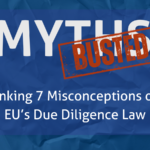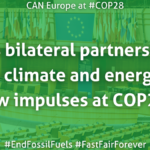At the Paris Agreement signing ceremony last week, the French President François Hollande announced that France will use Financial Transaction Tax (FTT) to increase its support for climate action in developing countries. It is a praiseworthy commitment, but the necessary funds will only be generated, if countries involved in the FTT negotiations work together to finally establish and operationalise it. Final agreement on the FTT is expected in June. Other countries should follow in France’s footsteps and allocate at least half of the revenues to climate and development.
By Maeve McLynn, Policy Coordinator Climate Change and Development
Pulling through some six years of austerity, civil society has heard time and time again that EU governments are too strapped for cash to meet development aid and climate finance targets. Despite lending a generous hand to the same sector that caused the financial meltdown, leaders have shied away from putting into effect comprehensive funding measures that could provide support to those that need it most.
One of those measures is the Financial Transaction Tax. It was introduced in the wake of the financial crisis; to some it is known as a Tobin tax, to others a Robin Hood tax. The basic principle is to place a minor charge on large scale financial transactions and use the money generated to support the needs of vulnerable and marginalised communities, at home, and in developing countries. A tiny tax of between 0.01% and 0.1% (depending on the transaction) could generate around €37bn/year Europe wide.
Eleven EU Member States initially signed up to the initiative – now down to ten – which has gone through numerous negotiations over the last few years. At the June 17 meeting of EU finance ministers, it is anticipated that the finance ministers from the ten countries will come together to anchor down some key elements of the Financial Transaction Tax. This moment can mark a turning point for both the financial sector, and for sustainable development and climate resilience across developing countries. The meeting of finance ministers can seal the deal on a funding measure that will generate billions of additional public funding for services and needs, both in Europe and across the world.
Among the technical discussions on tax rates and derivatives is the important topic of allocation of the funds that are generated. For years, civil society has been calling on EU governments to allocate at least half of the revenues generated from the FTT to international climate and development support. Doing so would provide valuable, predictable and reliable support to the many people and communities that suffer the worst impacts of climate change.
The French government has set a positive example through committing to allocate 50% of revenues from the FTT to climate action and pandemics. Last week we have heard that using funds from the FTT, France aims to increase its climate finance from €3 billion to €5 billion a year between now and 2020, with up to €1bn going specifically to climate change adaptation funding.
Following in France’s footsteps, it is high time for the others to show the political will, make the FTT happen and use it in the fight against climate change. The EU needs to step up its game if it is to remain a front-runner of climate and sustainable development ambition. Essential to staying at the top of the leader’s board, is the EU’s international financial support for climate action.



